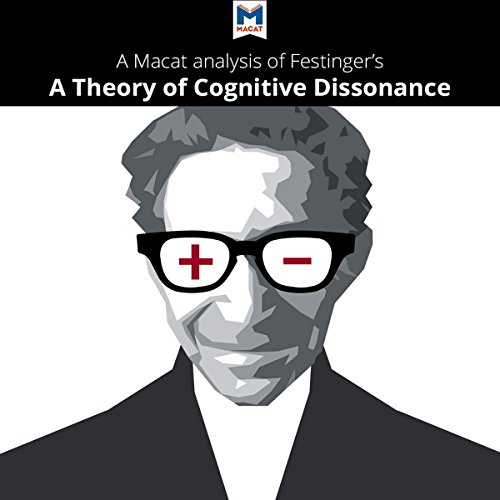Showing results by author "Alexander J. O'Connor" in All Categories
-
-
A Macat Analysis of Leon Festinger's A Theory of Cognitive Dissonance
- By: Camille Morvan, Alexander J. O'Connor
- Narrated by: Macat.com
- Length: 1 hr and 38 mins
- Unabridged
-
Overall0 out of 5 stars 0
-
Performance0 out of 5 stars 0
-
Story0 out of 5 stars 0
Why do we want to justify our decisions, even if they appear to be irrational? The answer lies in cognitive dissonance, the mental discomfort we experience when we hold two contradictory beliefs at the same time. In A Theory of Cognitive Dissonance, first published in 1957, American social psychologist Leon Festinger investigates the problem. Festinger puts forward the idea that we have developed mechanisms to try to deal with the stress brought on by cognitive dissonance.
-
A Macat Analysis of Leon Festinger's A Theory of Cognitive Dissonance
- Narrated by: Macat.com
- Length: 1 hr and 38 mins
- Release date: 30-06-16
- Language: English
Failed to add items
Sorry, we are unable to add the item because your shopping cart is already at capacity.Add to basket failed.
Please try again laterAdd to wishlist failed.
Please try again laterRemove from wishlist failed.
Please try again laterAdding to library failed
Please try againFollow podcast failed
Unfollow podcast failed
Regular price: £6.99 or 1 Credit
Sale price: £6.99 or 1 Credit
-
-
-
An Analysis of Philip Zimbardo's The Lucifer Effect: Understanding How Good People Turn Evil
- By: Alexander J. O'Connor
- Narrated by: Macat.com
- Length: 1 hr and 54 mins
- Unabridged
-
Overall5 out of 5 stars 5
-
Performance5 out of 5 stars 5
-
Story5 out of 5 stars 5
Born in 1933, Philip Zimbardo is a renowned and controversial American social psychologist who is fascinated by why people can sometimes behave in awful ways. Some psychologists believe people who commit cruelty are innately evil. Zimbardo disagrees. In his 2007 book, The Lucifer Effect, he argued that it is the power of situations around us that can cause otherwise good people to commit "evil", citing many historical examples to illustrate his point.
-
5 out of 5 stars
-
Brilliant Overall Summary
- By Rhiannon Walker on 23-09-24
-
An Analysis of Philip Zimbardo's The Lucifer Effect: Understanding How Good People Turn Evil
- Narrated by: Macat.com
- Length: 1 hr and 54 mins
- Release date: 19-07-16
- Language: English
Failed to add items
Sorry, we are unable to add the item because your shopping cart is already at capacity.Add to basket failed.
Please try again laterAdd to wishlist failed.
Please try again laterRemove from wishlist failed.
Please try again laterAdding to library failed
Please try againFollow podcast failed
Unfollow podcast failed
Regular price: £6.99 or 1 Credit
Sale price: £6.99 or 1 Credit
-
-
-
A Macat Analysis of Alan D. Baddeley and Graham Hitch's "Working Memory"
- By: Birgit Koopmann-Holm, Alexander J. O'Connor
- Narrated by: Macat.com
- Length: 1 hr and 39 mins
- Unabridged
-
Overall3.5 out of 5 stars 3
-
Performance3 out of 5 stars 2
-
Story3 out of 5 stars 2
In the 1960s, researchers into human memory began to understand memory as operating under two systems. The first was a short-term system handling information for mere seconds. The second was a long-term system capable of managing information indefinitely. They also discovered, however, that short-term memory was not simply a filing cabinet, but was actively working on cognitive - or mental - tasks. This is how the phrase "working memory" developed.
-
1 out of 5 stars
-
Repetitive
- By Marie Anna Alkan on 19-11-20
-
A Macat Analysis of Alan D. Baddeley and Graham Hitch's "Working Memory"
- Narrated by: Macat.com
- Length: 1 hr and 39 mins
- Release date: 06-06-16
- Language: English
Failed to add items
Sorry, we are unable to add the item because your shopping cart is already at capacity.Add to basket failed.
Please try again laterAdd to wishlist failed.
Please try again laterRemove from wishlist failed.
Please try again laterAdding to library failed
Please try againFollow podcast failed
Unfollow podcast failed
Regular price: £6.99 or 1 Credit
Sale price: £6.99 or 1 Credit
-
-
-
A Macat Analysis of Oliver Sacks's The Man Who Mistook His Wife for a Hat and Other Clinical Tales
- By: Dario Krpan, Alexander J. O'Connor
- Narrated by: Macat.com
- Length: 1 hr and 42 mins
- Unabridged
-
Overall2 out of 5 stars 1
-
Performance0 out of 5 stars 0
-
Story0 out of 5 stars 0
Neurologist Oliver Sacks' 1985 book The Man Who Mistook His Wife for a Hat challenges the impersonal approach doctors took to patient care and paved the way for a new literary genre: popular science. At the time of its publication, neurologists and physicians relied mainly on clinical studies and their own expertise to set the course of treatment. Sacks found this inhumane and developed a very different approach, clearly demonstrated in The Man Who Mistook His Wife.
-
A Macat Analysis of Oliver Sacks's The Man Who Mistook His Wife for a Hat and Other Clinical Tales
- Narrated by: Macat.com
- Length: 1 hr and 42 mins
- Release date: 27-07-16
- Language: English
Failed to add items
Sorry, we are unable to add the item because your shopping cart is already at capacity.Add to basket failed.
Please try again laterAdd to wishlist failed.
Please try again laterRemove from wishlist failed.
Please try again laterAdding to library failed
Please try againFollow podcast failed
Unfollow podcast failed
Regular price: £6.99 or 1 Credit
Sale price: £6.99 or 1 Credit
-





